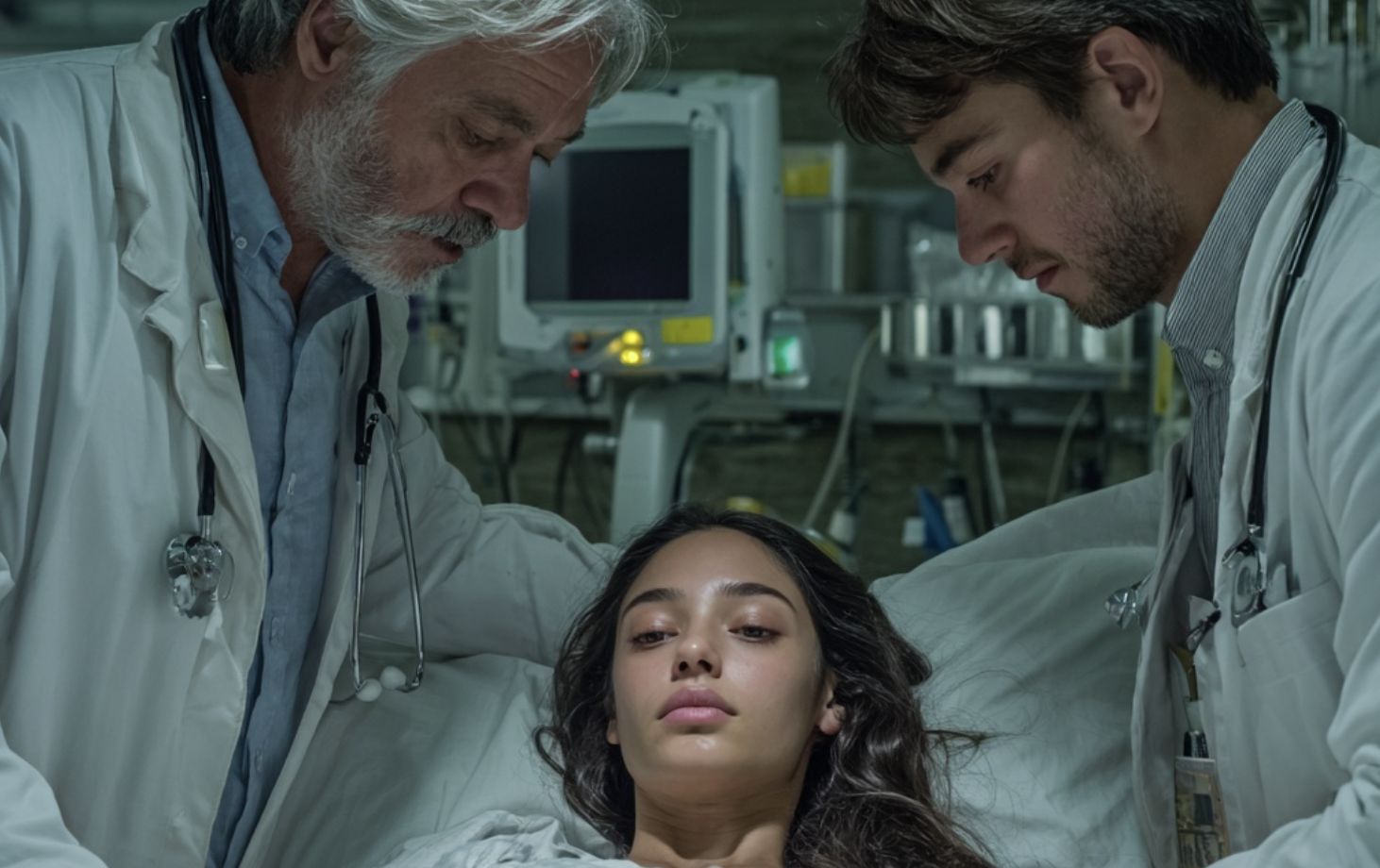The city, shrouded in dark shadows, breathed a muffled, heavy silence, broken only by the occasional wail of an ambulance siren. Inside the city hospital, where every corridor held the echoes of other people’s suffering, a storm raged no less fierce than the tempest beyond the windows. The night wasn’t merely tense—it hovered on the brink of eruption, as if fate itself had decided to test the mettle of those who stand guard over life.
In the operating room, lit by the cold, harsh glare of surgical lamps, Andrei Petrovich Sokolov—a doctor with twenty years’ experience, a man whose hands had saved hundreds, if not thousands, of lives—kept on fighting. For the third hour he had stood at the table, yielding not an inch before the pitiless surgery of time. His movements were as precise as clockwork, his gaze intent, as though he were reading not the anatomy of the body but the very fine thread between life and death. Fatigue weighed on his shoulders like a heavy cloak, but the seasoned surgeon knew: weakness was a luxury he could not afford. Every movement, every decision was worth its weight in gold. He wiped the sweat from his brow with the back of his hand, forcing himself not to be distracted. Beside him, like a shadow, stood the young nurse Marina—focused, composed, a tremor in her eyes. She passed instruments as if she were handing over not steel, but hope.
“Suture,” Sokolov said briefly, almost in a whisper. His voice, accustomed to giving orders, now sounded like a command to fate itself: do not yield.
The operation was nearing its end. A little more and the patient would be out of danger. But at that moment, as if reality itself chose to intrude, the OR doors flew open with a crash. The head nurse appeared on the threshold, her face twisted with alarm, her breathing uneven.
“Andrei Petrovich! Urgent! A woman unconscious, multiple contusions, suspected internal bleeding!” she blurted out, and in her voice was a fear seldom heard within hospital walls.
Sokolov didn’t hesitate for a second. He threw to his assistant, “Finish up here,” and in one motion stripped off his gloves.
“Marina, with me!” he ordered, already heading for the exit.
Chaos reigned in the ER. The air was thick with shouts, footsteps, the clatter of metal, and the bite of antiseptic. On a gurney, like a broken doll, lay a young woman of about thirty. Her face was deathly pale, her skin mottled with bruises, as if someone had methodically, with cold-blooded cruelty, inscribed her body with pain. Sokolov approached as he would a battlefield. His eyes, trained to see the hidden, began their assessment at once. He examined her and issued orders with icy precision:
“OR, now! Prep for laparotomy! Type and crossmatch, start an IV, call the ICU team! Move!”
“Who brought her?” he asked the duty nurse without taking his eyes off the patient.
“Her husband,” the nurse replied. “Says she fell down the stairs.”
Sokolov gave a dry grunt. A shadow of doubt flickered in his eyes. He knew—stairs didn’t leave marks like these. His gaze skimmed over the woman’s body like a scanner, searching for evidence. The traces of old hematomas, half-healed bruises, rib fractures of a characteristic pattern—none of it was the result of a fall. What caught his attention especially were strange, almost symmetrical burns on the wrists. As if someone had pressed them against something hot—systematically, deliberately. And then he saw something else: faint lines on the abdomen, resembling scars from a blade. Not random cuts. No. Signs of torture.
Half an hour later the woman was already on the operating table. Sokolov worked like a machine, but with a soul. He stopped the bleeding, repaired damaged tissue, fought with death itself. And then, for an instant, his hand paused. He saw something that should not have been there: more than scars—letters, words, burned or carved into the skin. As if someone had tried to erase her identity and leave a brand in its place.
“Marina,” he said quietly, without lifting his eyes from the patient, “as soon as we’re done, find the husband. He waits in the ER. He doesn’t leave. And… call the police. Quietly. No fuss.”
“You think…?” the nurse began, but left it unfinished.
“Thinking is for investigators,” he cut her off. “Our job is to save a life. And these injuries… they aren’t from a fall. And they aren’t the first. This isn’t an accident. It’s violence—long, systematic, cold-blooded.”
The operation lasted another hour. Every minute counted. But Sokolov did not yield. At last, the woman’s heart rhythm stabilized. Her life was saved. Her soul—not yet.
As he stepped out of the OR, the fatigue he’d kept at bay crashed over him like an avalanche. But a young officer was already waiting in the corridor—a sergeant with a notebook and a tense gaze.
“Captain Lebedev is on his way,” the sergeant said. “What can you tell us?”
Sokolov listed everything he had seen: internal bleeding, a ruptured spleen, dozens of injuries of varying ages, burns, cuts, evidence of old fractures.
“This wasn’t a fall,” he concluded. “It’s abuse. Someone has been destroying this woman for years. And most likely the very person who was supposed to protect her.”
A few minutes later Captain Lebedev appeared—trim, with piercing eyes, as if he could see not only facts but lies. He nodded to Sokolov.
“Have you known the victim long?”
“I’ve never seen her before,” the surgeon replied. “But if not for us, she wouldn’t have made it to morning. Her body is a map of suffering. Every scar is proof of someone’s cruelty.”
Lebedev listened in silence, then headed for the ER. Sokolov followed—not out of curiosity, but from the sense that he was already part of this story.
In the waiting area paced a man—neat, fair-haired, in a gray sweater. On his face, a mask of concern; in his eyes, something cold, contrived.
“How is my wife? What about Anya?” he rushed at the staff.
“Anna Viktorovna Klimova?” Lebedev clarified. “You’re her husband, Sergei Mikhailovich?”
“Yes, yes! Tell me—how is she?!”
“In the ICU. Her condition is stable but critical,” Sokolov said curtly. “Tell us exactly how she fell.”
“She tripped on the stairs,” Klimov rattled off as if reciting. “I was in the kitchen, heard a crash… I ran in—she was unconscious.”
“And you brought her straight here?” Lebedev asked.
“Of course! What, was I supposed to leave her?”
Sokolov studied him closely. An exemplary husband, by the look of it. But there was something in his gaze that didn’t match the anxiety. The look of a man used to control. To managing. And to punishing.
“Mr. Klimov,” Lebedev said evenly, “your wife has old injuries. Burns, cuts, fractures. How do you explain that?”
Klimov froze for a moment, then flared.
“Anya is clumsy! She’s always falling, burning herself! She cooks, that’s all!”
“Do people burn both wrists symmetrically in the kitchen?” Sokolov asked coolly. “And the cuts on her abdomen—are those a culinary mishap too?”
Klimov blanched, but recovered quickly.
“Are you accusing me?! My wife is in the hospital and you’re hounding me!”
“No one’s accusing you,” Lebedev said calmly. “But we’re obliged to look into it.”
Just then Marina appeared.
“Andrei Petrovich, the patient regained consciousness. She’s asking for her husband.”
Klimov lunged forward.
“I want to see her!”
“Impossible,” Sokolov said firmly. “Access is restricted. Captain, I suggest you speak with her. The truth may be in her words.”
Lebedev entered the ICU. Anna lay there like a wrung-out rag—pale, exhausted, bound in tubes. Seeing the doctors, she managed a faint smile.
“Did Seriozha come?”
“He’s in the ER,” Sokolov replied. “How are you feeling?”
“It hurts…” she whispered. “Did I fall?”
Lebedev introduced himself.
“Anna Viktorovna, do you remember how you were injured?”
She hesitated.
“I… tripped on the stairs. Seriozha always says—be more careful…”
“And the burns on your wrists—also from the kitchen?”
Fear flared in her eyes.
“I… I’m careless. I get burned.”
“Anna Viktorovna,” Sokolov said gently, “we’ve seen your injuries. This wasn’t an accident. Someone did this to you on purpose. We can help. But you have to tell the truth.”
She looked away. Tears slid down her cheeks.
“If I tell… it will be worse.”
“Has he threatened you?” Lebedev asked softly.
She was silent. The tears kept flowing.
“We’ll protect you,” the officer said. “But we need a statement. Otherwise, when you’re discharged, it will all happen again.”
“He’s not always like that…” she whispered. “Sometimes he’s kind… And then… something breaks inside him…”
“How long has this been going on?”
“Almost a year… After I lost my job. He said… that I depended on him completely now. That I had to be perfect.”
At that moment the door burst open. Klimov rushed in:
“Anechka! I was so worried!”
Lebedev barred his way.
“Please step out. We’re talking with the patient.”
“By what right?! I’m her husband!”
“By the authority of the law,” Lebedev replied coldly. “And I have grounds to believe these injuries are the result of a crime.”
Klimov went pale, then exploded:
“What did you tell them?! You’ll regret this!”
Anna looked at him. There was no love in her eyes. Only terror.
“I can’t anymore, Sergei… I’m afraid of you… Every evening—who will come home: my husband or the monster… You said no one needed me… that no one would believe me…”
Klimov lunged. Lebedev deftly pinned him and snapped on the cuffs.
“You are under arrest on suspicion of grievous bodily harm. You have the right to remain silent.”
When they led him away, Anna broke down in tears—but not from pain. From relief.
“Thank you…” she whispered. “I’d forgotten what it’s like to feel safe.”
Sokolov touched her shoulder.
“You made the right choice. Now—rest.”
“And after? I have no one…”
“There are support centers. Psychologists, lawyers, housing. You’re not alone.”
“What if he comes back?”
“With your statement and our reports—he’ll be away for a long time. And a restraining order will keep him from coming near you.”
A week later Sokolov saw an older woman in the ward—Anna’s mother. They held hands. And on Anna’s face, for the first time in a long while, there was a real smile.
“Doctor, this is my mother. She’ll take me home.”
“I’m happy for you,” Sokolov smiled. “It’s as if you’ve woken from a nightmare.”
“You saved my daughter twice,” the mother said. “From death—and from hell.”
“I simply looked deeper,” he replied. “Sometimes a single look is enough to change someone’s life.”
That evening, stepping out under the starry sky, Sokolov thought:
How many women still keep silent? How many are afraid?
But now he knew—every time a doctor looks not only at the body but at the soul, he does more than treat. He brings back to life.
And in that lies the highest medicine.



